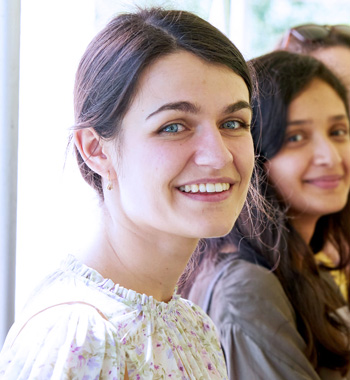Feature: Pandemic offers real-world lessons for public health grad
By Emily Leighton, MA’13
An unexpected phone call from Kingston’s public health unit left a lasting impression on Alexandra Romanski.
Working with a community literacy organization at the time, she had organized a taxi trip for student volunteers to a local library. The taxi, as she learned, had been in contact with a confirmed case of the measles.
“That phone call was my introduction to public health,” she said. “I learned about contact tracing and answered questions about my vaccination status.”
 The experience paved the way for her future career.
The experience paved the way for her future career.
With two bachelor’s degrees in life sciences and arts and world language studies from Queen’s University, Romanski says public health ticked a lot of professional boxes for her.
“Public health encompasses who we are in all aspects of our lives and communities,” she explained. “And it brings together my skills and interests in science, language and culture to be able to make a positive difference.”
Romanski applied to Schulich Medicine & Dentistry’s Master of Public Health Program just as the news of a novel coronavirus was breaking in the media. By the time she started her studies, the second wave of the COVID-19 pandemic was starting to take hold in Ontario.
“I remember telling people at the time that I was applying to a master of public health and had to explain what it was. Now, everyone knows what public health is and it’s something that is impacting our everyday lives,” she said.
Pursuing a master’s degree virtually during a global pandemic was challenging but offered many lessons. “Seeing public health decisions and conversations playing out very publicly was a unique learning opportunity,” she said.
Romanski points to the MPH Program’s team-based approach to learning as another highlight of her experience. Students are assigned to a learning team for the duration of the eight-month coursework section. These smaller groups complete assignments together and engage in discussion.
“We came from diverse backgrounds and offered unique insights and perspectives, which really enhanced my learning,” she said. “The small group setting taught me the importance of respecting and listening to others’ opinions, and taking the time to hear from everyone.”
After completing her practicum placement with the Centre for Foodborne, Environmental and Zoonotic Infectious Diseases at the Public Health Agency of Canada this past summer, Romanski is now working full-time with the organization. Her current role is focused on collecting and summarizing data on infectious diseases for use in decision-making, including compiling an evidence brief on a COVID-19 variant of concern, collecting data on non-enteric zoonotic diseases and creating rapid summaries of existing COVID-19 literature.
Looking to the future, she’s considering medical school, with an interest in the role physicians play in public health policy, prevention and emergency response.
Officially graduating from the MPH Program this month, Romanski is the recipient of the MPH Class of 2014 Award, selected by her peers for making significant contributions to their learning, as well as demonstrating leadership and a capacity for caring and compassion. Each year, the Award recognizes a member of the graduating class who has demonstrated a breadth of interests and who, in the opinion of their peers, has the professional and personal attitudes important in pursuing a successful career in public health.
Romanski is grateful to her classmates for the recognition and for making her year-long experience in the Program so special and memorable.
“My classmates are going to be leaders in public health in Canada and around the world,” she said. “I’m excited to see what they do in their careers and to cheer them on in their successes.”








